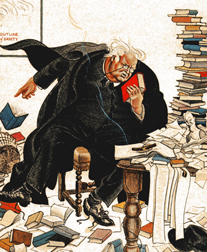Not G. K. Chesterton, too.
 Friday, August 15, 2008 at 07:19PM
Friday, August 15, 2008 at 07:19PM
Readers of The New Yorker puzzled recently over a seemingly pointless article about G. K. Chesterton, of use to me at least because he was, you guessed it, a Gemini (29 May 1874). When he was 19 he got deeply into the Ouija board with his 14 year
 old brother Cecil and they were scared witless. The experience was so powerful that Chesterton was shocked into lifelong orthodoxy. He and Cecil remained staunch brothers-in-arms, both professional progressive literary journalists in London, supporting and editing each other, co-editing journals, even sharing in libel trials, until Cecil’s death in the Great War.
old brother Cecil and they were scared witless. The experience was so powerful that Chesterton was shocked into lifelong orthodoxy. He and Cecil remained staunch brothers-in-arms, both professional progressive literary journalists in London, supporting and editing each other, co-editing journals, even sharing in libel trials, until Cecil’s death in the Great War.
The tendency among prominently paired literary siblings, for one of them to be a Gemini is marked: the Corneilles (Pierre's the gemini), the Goncourts (Edmond), the Manns (Thomas), the Hitchens (it's Peter), the Wolffs (Tobias), the Collins (Joan), Byatt/Drabble (Margaret), Cockburns (Alex), Dunnes (John Gregory), etc . . . where is my list?
Chesterton had that knack of creating an identity by pairing off. His biographer Joseph Pearce examines his long and successful, though childless, marriage with Frances Blogg in a chapter titled “Chesterblogg”. His signature controversies with Hilaire Belloc and G. B. Shaw get chapters likewise titled “Chesterbelloc” and “Chestershaw”. Called in the title of another biography “the Prince of Paradox” he bristles with dualisms. The caricature above calls attention to his wonderful plain old bookishness, which an old bookstore owner admires. He seems to have published yards of books; one collection of essays published in 1908 was called “All Things Considered.”
Chesterton is remembered mostly, however, for his Father Brown mysteries, which some esteem as highly as the Sherlock Holmes tales by Arthur Conan Doyle, also born under Gemini. Doyle was led to mediumship by the death of his brother. He paired up with Gemini Oliver Lodge for psychical investigations. Also involved with these two in the Society for Psychical Research was the scientist Sir William Crookes, (again, what else, a Gemini) the discoverer of the cathode/anode tube, who turned to the study of mediumship after the death of his brother.
 Oliver Lodge,
Oliver Lodge,  William Crookes,
William Crookes,  astrology,
astrology,  chesterton,
chesterton,  conan doyle,
conan doyle,  gemini in
gemini in  Gemini
Gemini  Print Article
Print Article 
Reader Comments